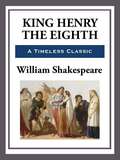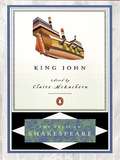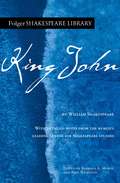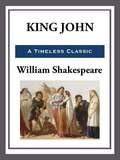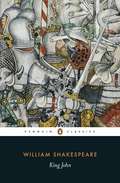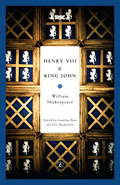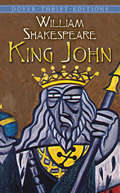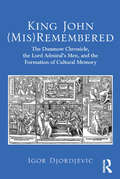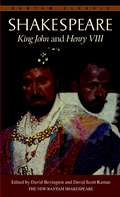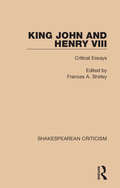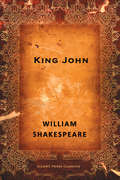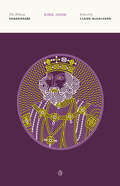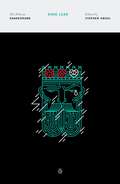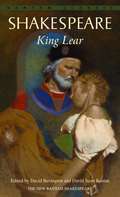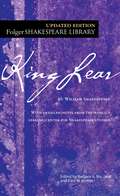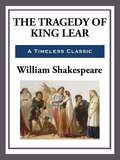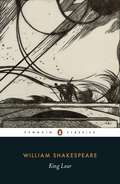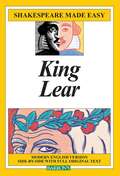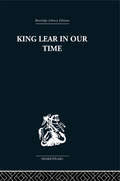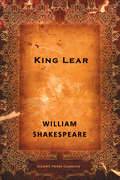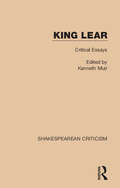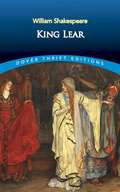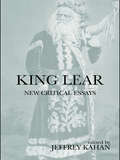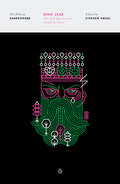- Table View
- List View
King Henry the Eighth
by William ShakespeareOne of the last plays written by Shakespeare, "Henry VIII" is one of his finest historical dramas. Focusing on the life and times of Henry VIII, one of England's most dynamic rulers, the play examines and dramatizes monarchical life of 16th century England. The plot surrounds the events of King Henry VIII's annulment of his marriage to Katherine of Aragon and engagement to Ann Boleyn. The play portrays the suppression of the protestant reformation and the split of the Anglican and Catholic churches with great valor. In Shakespeare's Henry VIII, religious power and political desire merge, resulting in a splendid historical tale.
King John
by William Shakespeare Stephen Orgel A. R. Braunmuller"I feel that I have spent half my career with one or another Pelican Shakespeare in my back pocket. Convenience, however, is the least important aspect of the new Pelican Shakespeare series. Here is an elegant and clear text for either the study or the rehearsal room, notes where you need them and the distinguished scholarship of the general editors, Stephen Orgel and A. R. Braunmuller who understand that these are plays for performance as well as great texts for contemplation." (Patrick Stewart) The distinguished Pelican Shakespeare series, which has sold more than four million copies, is now completely revised and repackaged. Each volume features: * Authoritative, reliable texts * High quality introductions and notes * New, more readable trade trim size * An essay on the theatrical world of Shakespeare and essays on Shakespeare's life and the selection of texts
King John
by William Shakespeare Paul Werstine Barbara MowatLike most of Shakespeare’s history plays, King John presents a struggle for the English crown. The struggle this time, however, is strikingly cold-blooded and brutal. John, the younger brother of the late Richard I, is the king, and a savage one. His opponent is a boy, his nephew Arthur, supported by the King of France and the Duke of Austria. After Arthur falls into John’s hands, John plots to torture him. Arthur’s capture gives Louis, the Dauphin of France, the opportunity to lay claim to John’s crown. John’s nobles support Louis, but he schemes to betray them. The play finds its hero in another figure: the Bastard, Sir Richard Plantagenet, an illegitimate son of Richard I. Although he has an appetite for war, he also has a strong conscience and speaks with trenchant irony. The authoritative edition of King John from The Folger Shakespeare Library, the trusted and widely used Shakespeare series for students and general readers, includes: -Freshly edited text based on the best early printed version of the play -Full explanatory notes conveniently placed on pages facing the text of the play -Scene-by-scene plot summaries -A key to the play’s famous lines and phrases -An introduction to reading Shakespeare’s language -An essay by a leading Shakespeare scholar providing a modern perspective on the play -Fresh images from the Folger Shakespeare Library’s vast holdings of rare books -An annotated guide to further reading Essay by Deborah T. Curren-Aquino The Folger Shakespeare Library in Washington, DC, is home to the world’s largest collection of Shakespeare’s printed works, and a magnet for Shakespeare scholars from around the globe. In addition to exhibitions open to the public throughout the year, the Folger offers a full calendar of performances and programs. For more information, visit Folger.edu.
King John
by William ShakespeareKing John is pitted against the united powers of France, Brittany, Austria, and the Papacy. As alliances are made, broken, and remade, the paranoid and erratic John reveals his weakness and reliance on those around him. Will England be destroyed by his fatal indecision?
King John
by William ShakespeareUnder the rule of King John, England is forced into war when the French challenge the legitimacy of John's claim to the throne and determine to install his nephew Arthur in his place. But political principles, hypocritically flaunted, are soon forgotten, as the French and English kings form an alliance based on cynical self-interest. And as the desire to cling to power dominates England's paranoid and weak-willed king, his country is threatened with disaster.
King John & Henry VIII
by William Shakespeare Jonathan Bate Eric Rasmussen"Mad world, mad kings, mad composition!" --King John In one volume, eminent Shakespearean scholars Jonathan Bate and Eric Rasmussen provide fresh new editions of two classic histories: Henry VIII and King John. THIS VOLUME ALSO INCLUDES MORE THAN A HUNDRED PAGES OF EXCLUSIVE FEATURES: * original Introductions to Henry VIII and King John * incisive scene-by-scene synopses and analyses with vital facts about the works * commentary on past and current productions based on interviews with leading directors, actors, and designers * photographs of key RSC productions * an overview of Shakespeare's theatrical career and chronology of his plays Ideal for students, theater professionals, and general readers, these modern and accessible editions from the Royal Shakespeare Company set a new standard in Shakespearean literature for the twenty-first century.From the Trade Paperback edition.
King John (Dover Thrift Editions: Plays Ser.)
by William ShakespeareAmid a backdrop of war, conspiracy, and murder, this historical play depicts the troubled reign of King John, who ruled England from 1199 to 1216. Shakespeare's most enigmatic king struggles with the shifting loyalties of his nobles as well as threats from his covetous heirs and the burdens of his own conscience. The play, which abounds in battles and betrayals, explores issues of politics, inheritance, and legitimacy. John's problems are threefold: he has usurped the throne from the rightful heir, his nephew Arthur; his relationship with the Vatican is troubled; and he is highly unpopular with his own subjects. Shakespeare's portrayal of the despised monarch finds a more heroic figure in Sir Richard Plantagenet, an illegitimate son of Richard I. The Bastard, as John's loyal nephew is known, forms the moral center of the play as well as a source of irreverent humor and honesty. A cynical play about power struggles, King John offers a remarkably contemporary mix of history and ironic commentary, balanced in equal measures by elements of tragedy and satire.
King John (Mis)Remembered: The Dunmow Chronicle, The Lord Admiral's Men, And The Formation Of Cultural Memory
by Igor DjordjevicKing John’s evil reputation has outlasted and proved more enduring than that of Richard III, whose notoriety seemed ensured thanks to Shakespeare’s portrayal of him. The paradox is even greater when we realize that this portrait of John endures despite Shakespeare’s portrait of him in the play King John, where he hardly comes off as a villain at all. Here Igor Djordjevic argues that the story of John’s transformation in cultural memory has never been told completely, perhaps because the crucial moment in John’s change back to villainy is a literary one: it occurs at the point when the 'historiographic' trajectory of John’s character-development intersects with the 'literary' evolution of Robin Hood. But as Djordjevic reveals, John’s second fall in cultural memory became irredeemable as the largely unintended result of the work of three men - John Stow, Michael Drayton, Anthony Munday - who knew each other and who all read a significant passage in a little known book (the Chronicle of Dunmow), while a fourth man’s money (Philip Henslowe) helped move the story from page to stage. The rest, as they say, is history. Paying particular attention to the work of Michael Drayton and Anthony Munday who wrote for the Lord Admiral’s Men, Djordjevic traces the cultural ripples their works created until the end of the seventeenth century, in various familiar as well as previously ignored historical, poetic, and dramatic works by numerous authors. Djordjevic’s analysis of the playtexts’ source, and the personal and working relationship between the playwright-poets and John Stow as the antiquarian disseminator of the source text, sheds a brighter light on a moment that proves to have a greater significance outside theatrical history; it has profound repercussions for literary history and a nation’s cultural memory.
King John and Henry VIII
by William ShakespeareHenry VIII is a fabulous spectacle of solemnity and ceremony, as well as an exploration of the strange ways in which the rise and fall from authority of individuals led finally to England's fate as a Protestant nation.
King John and Henry VIII: Critical Essays (Shakespearean Criticism)
by Frances A. ShirleyOriginally published in 1988. Arranged by play, the essays presented here focus first on production and then on a range of other issues such as characters, imagery, textual problems and themes. Both plays were more popular in earlier centuries and most later essayists focused on small issues rather than view the plays in wider perspective. More recent pieces included here seek organising principles for King John and look in more detail at Henry VIII. Beginning with the in-depth introduction by the editor, this collection shows the reception of the play by its Elizabethan audience compared to twentieth century audiences and looks at the history portrayed by Shakespeare. Some chapters review very varied stage productions while others are character analysis or individual focuses.
King John: A History
by William ShakespeareTreachery and betrayal are the order of the day during the reign of King John of England (1199-1216). After he is forced to recognize the illegitimate son of his dead brother, King Richard I, King John finds himself under siege by the French king, Philip. Dealing with themes of royal legitimacy, succession, and the tenuous nature of diplomatic relationships, King John parallels issues prevalent in Shakespeare's own society at the time.
King John: A Tragedy (The Pelican Shakespeare)
by William Shakespeare Stephen Orgel A. R. Braunmuller Claire McEachernThe acclaimed Pelican Shakespeare series edited by A. R. Braunmuller and Stephen Orgel The legendary Pelican Shakespeare series features authoritative and meticulously researched texts paired with scholarship by renowned Shakespeareans. Each book includes an essay on the theatrical world of Shakespeare’s time, an introduction to the individual play, and a detailed note on the text used. Updated by general editors Stephen Orgel and A. R. Braunmuller, these easy-to-read editions incorporate over thirty years of Shakespeare scholarship undertaken since the original series, edited by Alfred Harbage, appeared between 1956 and 1967. With definitive texts and illuminating essays, the Pelican Shakespeare will remain a valued resource for students, teachers, and theater professionals for many years to come. For more than seventy years, Penguin has been the leading publisher of classic literature in the English-speaking world. With more than 1,700 titles, Penguin Classics represents a global bookshelf of the best works throughout history and across genres and disciplines. Readers trust the series to provide authoritative texts enhanced by introductions and notes by distinguished scholars and contemporary authors, as well as up-to-date translations by award-winning translators.
King Lear
by William Shakespeare Stephen Orgel A. R. BraunmullerThe acclaimed Pelican Shakespeare series, now in a dazzling new series design in time for the 400th anniversary of the Bard's death The legendary Pelican Shakespeare series features authoritative and meticulously researched texts paired with scholarship by renowned Shakespeareans. Each book includes an essay on the theatrical world of Shakespeare's time, an introduction to the individual play, and a detailed note on the text used. Updated by general editors Stephen Orgel and A. R. Braunmuller, these easy-to-read editions incorporate over thirty years of Shakespeare scholarship undertaken since the original series, edited by Alfred Harbage, appeared between 1956 and 1967. With stunning new covers, definitive texts, and illuminating essays, the Pelican Shakespeare will remain a valued resource for students, teachers, and theater professionals for many years to come.This edition of King Lear presents a conflated text, combining the 1608 Quarto and 1623 Folio Texts, edited with an introduction by series editor Stephen Orgel.For more than seventy years, Penguin has been the leading publisher of classic literature in the English-speaking world. With more than 1,700 titles, Penguin Classics represents a global bookshelf of the best works throughout history and across genres and disciplines. Readers trust the series to provide authoritative texts enhanced by introductions and notes by distinguished scholars and contemporary authors, as well as up-to-date translations by award-winning translators.From the Trade Paperback edition.
King Lear
by William Shakespeare David Bevington David Scott KastanA king foolishly divides his kingdom between his scheming two oldest daughters and estranges himself from the daughter who loves him. So begins this profoundly moving and disturbing tragedy that, perhaps more than any other work in literature, challenges the notion of a coherent and just universe. The king and others pay dearly for their shortcomings-as madness, murder, and the anguish of insight and forgiveness that arrive too late combine to make this an all-embracing tragedy of evil and suffering.Each Edition Includes:* Comprehensive explanatory notes * Vivid introductions and the most up-to-date scholarship * Clear, modernized spelling and punctuation, enabling contemporary readers to understand the Elizabethan English* Completely updated, detailed bibliographies and performance histories * An interpretive essay on film adaptations of the play, along with an extensive filmography
King Lear
by William Shakespeare Paul Werstine Dr Barbara MowatShakespeare's King Lear challenges us with the magnitude, intensity, and sheer duration of the pain that it represents. Its figures harden their hearts, engage in violence, or try to alleviate the suffering of others. Lear himself rages until his sanity cracks. What, then, keeps bringing us back to King Lear? For all the force of its language, King Lear is almost equally powerful when translated, suggesting that it is the story, in large part, that draws us to the play. The play tells us about families struggling between greed and cruelty, on the one hand, and support and consolation, on the other. Emotions are extreme, magnified to gigantic proportions. We also see old age portrayed in all its vulnerability, pride, and, perhaps, wisdom--one reason this most devastating of Shakespeare's tragedies is also perhaps his most moving. The authoritative edition of King Lear from The Folger Shakespeare Library, the trusted and widely used Shakespeare series for students and general readers, is now available as an eBook. Features include: · The exact text of the printed book for easy cross-reference · Hundreds of hypertext links for instant navigation · Freshly edited text based on the best early printed version of the play · Full explanatory notes conveniently placed on pages facing the text of the play · Scene-by-scene plot summaries · A key to famous lines and phrases · An introduction to reading Shakespeare's language · Illustrations from the Folger Shakespeare Library's vast holdings of rare books · An essay by a leading Shakespeare scholar providing a modern perspective on the play
King Lear
by William ShakespeareKing Lear descends into madness after foolishly disposing of his estate between two of his three daughters based on their flattery, bringing tragic consequences for all.
King Lear
by William Shakespeare'The most perfect specimen of the dramatic art existing in the world' Percy Bysshe ShelleyShakespeare's bleak and brutal tragedy begins when an ageing king, seeking a successor, rejects the young daughter who loves him and misplaces his trust in her malevolent sisters. In return they strip him of his power and condemn him to a wretched wasteland of horror and insanity. Set in a pitiless universe, King Lear is a towering, elemental masterpiece of fierce poetry and vast imaginative scope.Used and Recommended by the National TheatreGeneral Editor Stanley WellsEdited by George HunterIntroduction by Kiernan Ryan
King Lear (Shakespeare Made Easy)
by William Shakespeare Alan DurbandHere are the books that help teach Shakespeare plays without the teacher constantly needing to explain and define Elizabethan terms, slang, and other ways of expression that are different from our own. Each play is presented with Shakespeare's original lines on each left-hand page, and a modern, easy-to-understand "translation" on the facing right-hand page. All dramas are complete, with every original Shakespearian line, and a full-length modern rendition of the text. These invaluable teaching-study guides also include: Helpful background information that puts each play in its historical perspective. Discussion questions that teachers can use to spark student class participation, and which students can use as springboards for their own themes and term papers. Fact quizzes, sample examinations, and other features that improve student comprehension of what each play is about.
King Lear and the Naked Truth: Rethinking the Language of Religion and Resistance
by Judy KronenfeldTaking King Lear as her central text, Judy Kronenfeld seriously questions the critical assumptions of much of today's most fashionable Shakespeare scholarship. Charting a new course beyond both New Historicist and deconstructionist critics, she suggests a theory of language and interpretation that provides essential historical and linguistic contexts for the key terms and concepts of the play. Opening the play up to the implications of these contexts and this interpretive theory, she reveals much about Lear, English Reformation religious culture, and the state of contemporary criticism.Kronenfeld's focus expands from the text of Shakespeare's play to a discussion of a shared Christian culture--a shared language and set of values--a common discursive field that frames the social ethics of the play. That expanded focus is used to address the multiple ways that clothing and nakedness function in the play, as well as the ways that these particular images and terms are understood in that shared context. As Kronenfeld moves beyond Lear to uncover the complex resonances of clothing and nakedness in sermons, polemical tracts, legislation, rhetoric, morality plays, and actual or alleged practices such as naked revolts by Anabaptists and the Adamians' ritual disrobing during religious services, she demonstrates that many key terms and concepts of the period cannot be tied to a single ideology. Instead, they represent part of an intricate network of thought shared by people of seemingly opposite views, and it is within such shared cultural networks that dissent, resistance, and creativity can emerge. Warning her readers not to take the language of literary texts out of the linguistic context within which it first appeared, Kronenfeld has written a book that reinterprets the linguistic model that has been the basis for much poststructuralist criticism.
King Lear in our Time
by Maynard MackThis edition first published in 1966. Previous edition published 1965 by the University of California Press. Perhaps more than any other play of Shakespeare's King Lear has been subjected to almost totally contradictory interpretations. In the first historical section of the book the author describes the varying concepts of the play and the distortions of text and even plot that have been widely used. Garrick's playing of Lear as a pathetic and down-trodden old man. Laughton's and Olivier's versions and Herbert Blaus's theory of the 'subtext' are described and analysed. The central section of the book examines the medieval, folk and romance sources of the play. The final chapter illustrates how the action of the play and its pervading violence and evil are not explained in terms of human motive and rely for their meaning more on their effects than their antecedents. An important theme is the play's examination of society and the ties of service and family love.
King Lear: A Tragedy
by William ShakespeareKing Lear, growing old and too tired to reign, decides to divide his realm amongst his three daughters, leaving the largest share to the one who loves him the most. His two eldest daughters, Goneril and Regan, foolish and deceitful children, are rewarded for their insincere flattery. His youngest daughter, Cordelia, however, speaks honestly and truthfully, which enrages the old king. He disinherits Cordelia, and then drives himself to madness, left to wander the heath with only his Fool, his servant Caius, and the madman Tom O'Bedlam for company. Once reunited with Cordelia, Lear is too late repents his rashness, and must face the tragic consequences of his choices.
King Lear: Critical Essays (Shakespearean Criticism #33)
by Kenneth MuirOriginally published in 1984. With selections organised chronologically, this collection presents the best writing on one of Shakespeare’s most studied plays. The structure displays the changing responses to the play and includes a wide range of criticism from the likes of Coleridge, Hazlitt, Moulton, Granville-Barker, Orwell, Levin, Stampfer, Gardner and Speaight interspersed with short entries from Keats, Raleigh, Freud and others. The final chapter by the editor elucidates his own thoughts on Lear, building on his commentary in the Introduction which puts the collection in context.
King Lear: Large Print (Dover Thrift Editions)
by William ShakespeareFirst performed about 1805, King Lear is one of the most relentlessly bleak of Shakespeare's tragedies. Probably written between Othello and Macbeth, when the playwright was at the peak of his tragic power, Lear's themes of filial ingratitude, injustice, and the meaninglessness of life in a seemingly indifferent universe are explored with unsurpassed power and depth.The plot concerns a monarch betrayed by his daughters, robbed of his kingdom, descending into madness. Greed, treachery, and cruelty are rife and the denouement of the play is both brutal and heartbreaking. In fact, so troubling is its vision of man's life that, until the mid-19th century, the play was performed most often with a non-Shakespearean happy ending, with Lear back on his throne and Cordelia, the daughter nearest his heart, happily married to the noble Edgar. But there is a dark magnificence to Shakespeare's original vision of the Lear story, and the play is performed today essentially as he wrote it, uncompromised by later "improvements." King Lear is reprinted here from an authoritative British edition, complete with explanatory footnotes.
King Lear: New Critical Essays (Shakespeare Criticism)
by Jeffrey KahanIs King Lear an autonomous text, or a rewrite of the earlier and anonymous play King Leir? Should we refer to Shakespeare’s original quarto when discussing the play, the revised folio text, or the popular composite version, stitched together by Alexander Pope in 1725? What of its stage variations? When turning from page to stage, the critical view on King Lear is skewed by the fact that for almost half of the four hundred years the play has been performed, audiences preferred Naham Tate's optimistic adaptation, in which Lear and Cordelia live happily ever after. When discussing King Lear, the question of what comprises ‘the play’ is both complex and fragmentary. These issues of identity and authenticity across time and across mediums are outlined, debated, and considered critically by the contributors to this volume. Using a variety of approaches, from postcolonialism and New Historicism to psychoanalysis and gender studies, the leading international contributors to King Lear: New Critical Essays offer major new interpretations on the conception and writing, editing, and cultural productions of King Lear. This book is an up-to-date and comprehensive anthology of textual scholarship, performance research, and critical writing on one of Shakespeare's most important and perplexing tragedies. Contributors Include: R.A. Foakes, Richard Knowles, Tom Clayton, Cynthia Clegg, Edward L. Rocklin, Christy Desmet, Paul Cantor, Robert V. Young, Stanley Stewart and Jean R. Brink
King Lear: The 1608 Quarto and 1623 Folio Texts (The Pelican Shakespeare)
by William Shakespeare Stephen Orgel A. R. BraunmullerThe acclaimed Pelican Shakespeare series, now in a dazzling new series designWinner of the 2016 AIGA + Design Observer 50 Books | 50 Covers competitionGold Medal Winner of the 3x3 Illustration Annual No. 14 This edition of King Lear presents a conflated text, combining the 1608 Quarto and 1623 Folio Texts, edited with an introduction by series editor Stephen Orgel and was recently repackaged with cover art by Manuja Waldia. Waldia received a Gold Medal from the Society of Illustrators for the Pelican Shakespeare series. The legendary Pelican Shakespeare series features authoritative and meticulously researched texts paired with scholarship by renowned Shakespeareans. Each book includes an essay on the theatrical world of Shakespeare’s time, an introduction to the individual play, and a detailed note on the text used. Updated by general editors Stephen Orgel and A. R. Braunmuller, these easy-to-read editions incorporate over thirty years of Shakespeare scholarship undertaken since the original series, edited by Alfred Harbage, appeared between 1956 and 1967. With stunning new covers, definitive texts, and illuminating essays, the Pelican Shakespeare will remain a valued resource for students, teachers, and theater professionals for many years to come.For more than seventy years, Penguin has been the leading publisher of classic literature in the English-speaking world. With more than 1,700 titles, Penguin Classics represents a global bookshelf of the best works throughout history and across genres and disciplines. Readers trust the series to provide authoritative texts enhanced by introductions and notes by distinguished scholars and contemporary authors, as well as up-to-date translations by award-winning translators.
